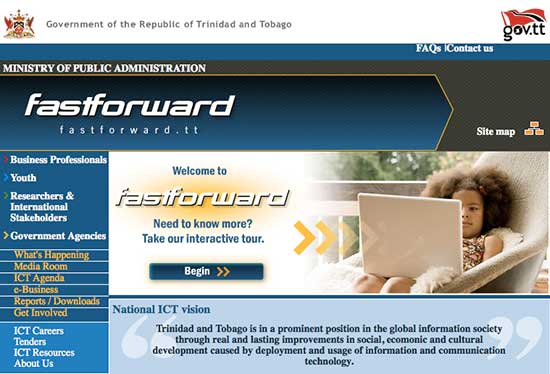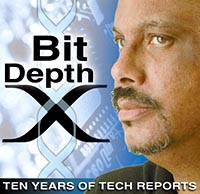BitDepth 654 - November 18
17/11/08 21:04 Filed in: BitDepth - November 2008
The first five years of Fast Forward are an era of Internet development that the Government doesn't want to talk about.
What about Fast Forward 1?

Fast Forward, we hardly knew ye. After five years of planning and spending, the only public gravestone of the first Fast Forward project is a cobweb site that hasn’t been updated for months.
Just over two weeks ago, a senior advertising executive contacted me about the National ICT Symposium that ends today. “Nobody I know,” he said, “has heard of Fast Forward.”
On his agenda was some curtain raising buzz about the symposium. Would I be interested in helping?
Of course, that’s a no-brainer. Throughout the existence of this column, its one overriding reason for existence is the promotion of information and communications technology locally.
Unfortunately, the way that I interpret that goal sometimes comes into conflict with the mission of communications professionals and their clients.
There was a place for pre-symposium discussion of the Government’s plans for ICT in Trinidad and Tobago, but any overture to the future needed to embrace an accounting of what happened over the first five years of the Fast Forward initiative, and that’s what I asked for.
What ensued was two weeks of e-mails and calls that ultimately yielded no discernible interest in any discussion of the five-year-old Government initiative to build infrastructure, policy and services in support of a tangible improvement in Trinidad and Tobago’s ICT profile.
Nothing would please me more than to be wrong about this, but there seems to be little hope that any part of the ICT symposium scheduled to run from its launch on November 16 to its final sessions on November 18 will spend any time evaluating what worked and didn’t work for Fast Forward 1.
What was Fast Forward?
The Fast Forward initiative was born out of the Government’s desire to fulfil crucial measures in order to achieve developed nation status by 2020. As part of the Vision 2020 plan, FF-1 was accorded appropriate front burner status and launched grandly in the last quarter of 2003, with splashy print and television advertising that sought to position the effort as hip, knowledgeable and inclusive.
But from the outset, Fast Forward was created with only a dim understanding of what would really be necessary to achieve the intimidatingly long list of goals that the consulting committees created.
What the project needed was a champion equivalent to Ken Julien in the energy sector. Without that kind of leadership talking to the highest levels of Government, Fast Forward’s work stumbled along, its few visible successes credited either to the bodies that actually implemented them or to the Ministries with line responsibility for specific areas of improvement.
The fast fade
What was left for the Fast Forward team were the soft and fuzzy bits that nobody wanted to claim, which included the ill-starred launch of a Government link aggregation portal meant to fulfil at least part of a mandate to link Ministries and Government agencies together and make their services available on the Internet.
My snarky representation of this unfortunate launch earned an angry response from an inside man on the team. “Until you have tried to get information from 20 some odd Ministries and tried to start the necessary process re-engineering to make this and other initiatives effective and efficient, then you can talk,” wrote AD in a comment on my blog.
This, unfortunately, is where my concerns as a columnist diverge from those who have undertaken a responsibility to produce. Where AD found “a Gov't service which is still run by non-ICT savvy persons, with not enough daring to challenge the status quo,” I find myself unsurprised.
The faltering status of Fast Forward I does not absolve the government of a responsibility to report on the results of five years of work and spending.
At launch, the project had a five-year budget expenditure pegged at US$82 million in 2003 and a long list of proposals that remain largely in limbo.
While it’s important to look forward hopefully with this symposium, there remains outstanding an accounting of results against stated expectations, which even a champion of the project described as a “tooth and nail” but wholly predictable conflict between fast changing technology and government bureaucracy.

Fast Forward, we hardly knew ye. After five years of planning and spending, the only public gravestone of the first Fast Forward project is a cobweb site that hasn’t been updated for months.
Just over two weeks ago, a senior advertising executive contacted me about the National ICT Symposium that ends today. “Nobody I know,” he said, “has heard of Fast Forward.”
On his agenda was some curtain raising buzz about the symposium. Would I be interested in helping?
Of course, that’s a no-brainer. Throughout the existence of this column, its one overriding reason for existence is the promotion of information and communications technology locally.
Unfortunately, the way that I interpret that goal sometimes comes into conflict with the mission of communications professionals and their clients.
There was a place for pre-symposium discussion of the Government’s plans for ICT in Trinidad and Tobago, but any overture to the future needed to embrace an accounting of what happened over the first five years of the Fast Forward initiative, and that’s what I asked for.
What ensued was two weeks of e-mails and calls that ultimately yielded no discernible interest in any discussion of the five-year-old Government initiative to build infrastructure, policy and services in support of a tangible improvement in Trinidad and Tobago’s ICT profile.
Nothing would please me more than to be wrong about this, but there seems to be little hope that any part of the ICT symposium scheduled to run from its launch on November 16 to its final sessions on November 18 will spend any time evaluating what worked and didn’t work for Fast Forward 1.
What was Fast Forward?
The Fast Forward initiative was born out of the Government’s desire to fulfil crucial measures in order to achieve developed nation status by 2020. As part of the Vision 2020 plan, FF-1 was accorded appropriate front burner status and launched grandly in the last quarter of 2003, with splashy print and television advertising that sought to position the effort as hip, knowledgeable and inclusive.
But from the outset, Fast Forward was created with only a dim understanding of what would really be necessary to achieve the intimidatingly long list of goals that the consulting committees created.
What the project needed was a champion equivalent to Ken Julien in the energy sector. Without that kind of leadership talking to the highest levels of Government, Fast Forward’s work stumbled along, its few visible successes credited either to the bodies that actually implemented them or to the Ministries with line responsibility for specific areas of improvement.
The fast fade
What was left for the Fast Forward team were the soft and fuzzy bits that nobody wanted to claim, which included the ill-starred launch of a Government link aggregation portal meant to fulfil at least part of a mandate to link Ministries and Government agencies together and make their services available on the Internet.
My snarky representation of this unfortunate launch earned an angry response from an inside man on the team. “Until you have tried to get information from 20 some odd Ministries and tried to start the necessary process re-engineering to make this and other initiatives effective and efficient, then you can talk,” wrote AD in a comment on my blog.
This, unfortunately, is where my concerns as a columnist diverge from those who have undertaken a responsibility to produce. Where AD found “a Gov't service which is still run by non-ICT savvy persons, with not enough daring to challenge the status quo,” I find myself unsurprised.
The faltering status of Fast Forward I does not absolve the government of a responsibility to report on the results of five years of work and spending.
At launch, the project had a five-year budget expenditure pegged at US$82 million in 2003 and a long list of proposals that remain largely in limbo.
While it’s important to look forward hopefully with this symposium, there remains outstanding an accounting of results against stated expectations, which even a champion of the project described as a “tooth and nail” but wholly predictable conflict between fast changing technology and government bureaucracy.
blog comments powered by Disqus

